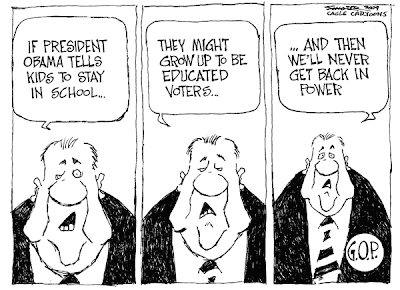
A couple months ago President Obama set about speaking to children at schools across the country. In Jessica's analysis she used Bill Schorr's political cartoon to help pointed out the logical fallacies in the right wing school of thought concerning the matter. The cartoon shows that conservatives think Obama's school speeches will lead to the demise of the Republican Party. Right wing conservatives didn't want their children persuaded to be democrats by being subjected to a democratic lecture in school. Some parents even kept kept their children home from school. They didn't want their children to be "brainwashed" into following and supporting Obama.
In Jessica's analysis she pointed out two logical fallacies in the conservative reasoning. First, she observed how the right wing argument was a hasty generalization. Just because voters are educated doesn't mean they will vote democratic. Members of both political parties are just as educated as the other. In adding to this analysis, it should also be noted that the argument is a post hoc fallacy. A post hoc fallacy is an assumption that because one event follows another, the first event caused the second. In this specific case the first event is the school lectures, and the second event is voting day when their children vote for a democrat. The argument becomes even more fallacious because the conservatives are jumping the gun, and assuming that the school lectures have already led to their children voting against their ideology. It is a huge assumption, and it brings us back to Jessica's point of the hasty generalization.
The second fallacy pointed out by Jessica is oversimplification. They ignore all other reasons why the Democratic Party is in power, and instead they blame it solely on Obama's little motivational speeches. It could also be deemed a slippery slope fallacy. Schorr's cartoon illustrates how one thing leads to the next, which leads to the next. This train of thought is not easy to stop; you just keep assuming that one event will lead to an even more catastrophic event. Maybe someday all the little school children who sat trough Obama's lectures will grow up to be socialists. Adding Jessica's insight, the fallacy here becomes an oversimplified slippery slope, with only a few stops on the way down. Blaming Obama's recent school speeched is also fallacious he didn't even start the speeches until he was already in office. You can't blame an event from 2009 for an event that occured in 2008. Time moves forward, not backwards.
On a side note, Bill Schorr's political cartoon, although great at fulfilling its purpose, may also have a couple fallicious tricks at work. For one, take a look at that obnoxiously ugly republican. Who really looks like that? Certainly nobody in the Democratic Party, right? Furthermore, the speech bubbles illustrate first grade reasoning with a first grade speech level. Bill Schorr even took advantage of facial expressions. The character's face doesn't light up with anxiety until the third and final frame, as if it took him that long to figure out where his sentence was going to lead him. Granted, cartoons are meant to be funny and exaggerated; they just use some fabulous fallacies in the process.
Despite the cartoon's tricks, it makes a great point: the bottom line is that right wing conservatives are still failing to look at the big picture. There is far more to politics than giving speeches to children at schools. Besides, how many opportunities does one get to hear the president speak? If conservatives would look past the immediate future they might see the benefits of attending such a lecture. Listening to a democratic president speak is not even close to a sure-fire way to turn republican children into democrats. The children may not even know what a political party is. So please, let the kids listen to the president.
Schorr, Bill. "Cagle Cartoons." Cartoon. Daryl Cagle's Poltical Cartoon Index. msnbc.com, 18 Sept. 2009. Web. 23 Sept. 2009.
So, this statement is from a web page giving examples of logical fallacies, right?
ReplyDeleteI'd like you and Joel to start over, and find logical fallacies in real articles on your own.
Also: when you are analyzing something someone else has already analyzed, you need to build off their analysis, disagree with their analysis, or otherwise interact with it instead of just starting again from scratch.
All better!
ReplyDelete